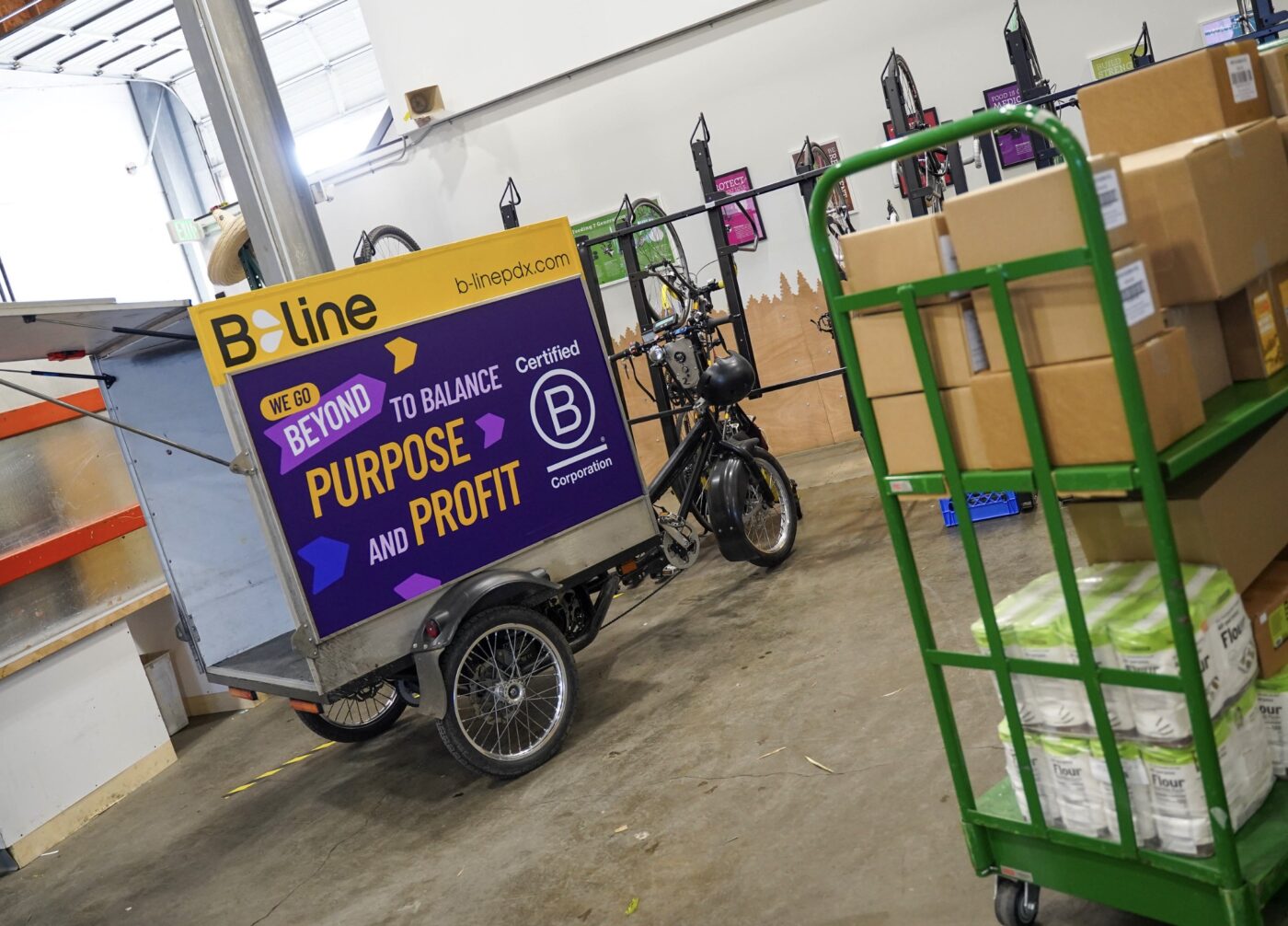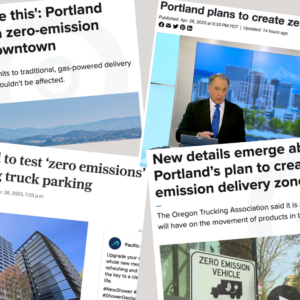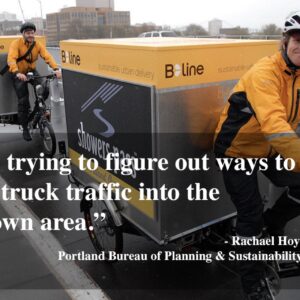
The City of Portland has taken a step toward decarbonizing its freight system. The Portland Bureau of Transportation wants to turn downtown parking garages into cargo hubs where electric bikes and other small vehicles would load up with goods and deliver them to customers nearby.
PBOT issued a request for information (RFI) last month for their “Micro-Delivery Hub Pilot in a City-Owned Parking Garage” project. It’s the latest extension of Portland’s effort to eliminate toxic emissions, improve street safety, and create a more vibrant, human-centered city by reducing the number of large delivery trucks in dense, commercial areas.
“This is a unique opportunity to explore the feasibility of repurposing space in a parking garage… Their relatively small footprint lends them to be well suited for the transfer of deliveries from a larger vehicle to a smaller vehicle, such as an e-cargo bike, that is better suited for short distance deliveries in a dense urban contexts,” reads the RFI.
PBOT owns and operates five “SmartPark” garages downtown. The pilot would utilize three of them, including locations at NW Naito Parkway and Davis, SW 10th and Yamhill, and SW 3rd and Alder.
PBOT has been dreaming of small delivery hubs full of e-bikes since at least 2021 when the Bureau of Planning and Sustainability first floated the concept to the Old Town Community Association. Since then the bureau has adopted the 2040 Portland Freight Plan, which prioritizes testing of “novel interventions” like micro-delivery hubs.
The idea is that these hubs would be tiny logistics facilities for private companies. Larger vehicles would transfer goods to smaller vehicles, like e-cargo bikes, for the last-mile delivery. Microhubs are already in use in New York City and the concept has worked in Paris and London. And PBOT isn’t new to this space. In 2023 they won a federal grant to establish a zero emission delivery zone. That project uses digital tools to monitor curbside traffic and sets aside several loading zones downtown where only zero emissions vehicles can operate.
Through this RFI, PBOT hopes to find local companies who see the potential of repurposing the valuable location of SmartPark garages. At the top of the list is B-Line PDX, a business founded in 2009 that owns and operates a fleet of electric cargo trikes and boasts dozens of clients who depend on Portland’s bike lanes to get their products to market. Other possible partners would be coffee roasters, bakeries, restaurant suppliers, and so on.
In the MicroDelivery Hub Feasibility Study published by the Bureau of Planning and Sustainability late last year, the city said, “To ensure their effectiveness, these hubs should be located near a well-integrated city bike network. This integration allows cargo bike riders to efficiently navigate the city after collecting deliveries from the hub.” PBOT is also exploring possible zoning code and other regulatory changes (such as reducing space for off-street vehicle loading if developers create space for cargo bike loading and parking) to facilitate the hubs.
“Portland is laying the groundwork for a future where sustainable deliveries thrive, emissions are reduced, and the urban fabric is safe and walkable,” the feasibility study states.
The RFI won’t issue any contracts, PBOT is simply probing interest at this point. View the bid solicitation here.







Thanks for reading.
BikePortland has served this community with independent community journalism since 2005. We rely on subscriptions from readers like you to survive. Your financial support is vital in keeping this valuable resource alive and well.
Please subscribe today to strengthen and expand our work.
I served on the PBOT Budget Advisory Committee from 2009-2015 (7 seasons, representing Portland east of 82nd, now District 1) and throughout that time the representatives from Downtown and the PBA would extract funds from the parking revenue to support their pet projects. If PBOT feels emboldened enough to send out this project for public review, I’m going to guess that they’ve already gotten an OK from the downtown powers-that-be, and further, that business and office occupancy rates downtown are so depressed that office rents are falling and these garages continue to be underused since the pandemic.
The garages according to the PBOT proposal are:
_ the Naito & Davis location at 33 NW Davis St
_ the 10th & Yamhill location at 730 SW 10th Avenue
_ the 3rd & Alder location at 620 SW 3rd Avenue.
I’m not opposed to PBOT’s proposal, but I am wondering, is this is the best use of these repulsively ugly piles of concrete?
Might it not be better if these building were torn down and replaced with high-rise Vancouver BC-style green-glass apartment blocks? Since PBOT is already into social-housing for storing personal automobiles citywide, might they be willing to become slumlords for storing human beings too? Maybe even be able to vacate, depave, and turn adjacent downtown streets into plazas, gardens, or cul-de-sacs, for the Mitch Green memorial plaza?
Maybe get a comment from Mitch on that one. He’s in no need of a memorial.
This article is fine as far as it goes, but I’m wondering how even a mid sized delivery truck would approach a parking garage, or enter it.
Micro hubs are a great idea and we’re late to the party.
Does anyone actually know what the economics of this proposal are? How much more (or less) does it cost to have a vehicle deliver your goods to a single location (for which you need to pay rent), then have a different fleet of vehicles fan out and deliver your goods around town? It seems like you now have more people and vehicles to manage and pay, and goods to keep an eye on while they’re waiting for last-mile delivery, but there’s a lot I don’t know about how it would work in practice.
Can anyone involved with this project explain how the money works?
It’s Portland….tax money grows on trees. Efficient use of that $ is not important. 🙂
There’s already a business model in Portland for this to work. B-line distributes other people’s products. They’re a specialist in delivery, they don’t make stuff.
Small manufactures or wholesalers, bakeries for instance, may not have the resources or volume to support a bike delivery fleet but they can contract for that service.
A delivery service probably runs on a low margin and can’t afford the initial cost of a warehouse with truck docks on one side and bike exits on another. If the city can find a suitable spot for such a facility they have the planning and financial resources to provide it more or less as a public utility.
We’ve all heard that Portland is strapped financially. That doesn’t mean we should abdicate foresight and abandon consideration of a project just because it is visionary. There are people doing bike delivery of bulky goods in Portland right now. It’s a category of employment that could grow, but one issue is that a truck load doesn’t match up well with even the largest cargo bike.
If there were a place where a delivery company, or companies, could take delivery of goods and store them securely for delivery that would be a public benefit. You’d have more bike delivery jobs, fewer trucks circling city streets, a better human environment, and efficient last mile logistics.
I’m all for redeveloping parking garages. They are a visual blight and right now several of them are sitting empty. Unfortunately there’s not a great way to approach a parking garage with a conventional truck unless you remove about a third of it to make space for backing in.
The old Oregonian printing plant would have made a great bike delivery hub. Oh well…
I think it’s a great idea, I just want to understand the economics. If the target “demographic” is small businesses with small deliveries, are there more of them than B-Line can handle? Are there other folks that want to get into the business, but are stymied by a lack of the kind of space you could get in a parking garage?
I guess what I really want to know is if there is a there there, or if this is just some idea that came up in a brainstorming session and somehow escaped the lab.
It’s been talked about in Portland:
https://bikeportland.org/2021/11/02/city-of-portland-considers-electric-cargo-bike-delivery-hubs-340801
I don’t pretend that funding is not awkward, and likely to get worse. I do think the city is in the unique place to support private industry in making this happen. B-line is a local bike oriented business that has done well and deserves support, but any large scale logistics business may have some experience* with bikes and they already have their own customer base.
Downtown Portland has taken some licks but removing truck traffic would go down well with the kind of redesign that could make it an attractive place to be.
If Keller Auditorium is replaced that’s an opportunity to improve the layout for semitrailer access to move shows in and out. I don’t imagine that kind of freight will be human powered any time soon, but pedicabs could play a role in circulating people between arts venues, close-in residential, shopping, and dining districts.
Portland is almost in reach of a network of protected bike lanes downtown. Pedicabs in particular seem like a good fit for protected infrastructure that connects to large venues and transit. I’d like to see effective bike infrastructure all across town but if people can see the thing work in one place maybe it’s an easier sell in others.
*notably in Europe
I remember that article, and didn’t really get it then, either. Maybe the lack of forward motion since then tells me what I need to know.
Regardless, I’m excited by anything that will replace trucks with bikes, especially if the city can earn a little money in the process.
Budget crisis and basic services are on the chopping block. Read the room, folks.
I’m not a huge fan of disruption for its own sake but it’s clear that economic upsets are also times of opportunity. People are hurt by a loss of property values but at the same time rents that are normally pretty inflexible may be lowered which can make possible enterprises that just didn’t pencil out before.
It would be crazy to roll up the sidewalks and ignore the opportunity to be creative and make changes. Food cart operators moving into brick and mortar restaurants are a recent example of a way that small scale businesses can grow the local economy. Recent construction has left us with a lot of empty storefronts and they’re going to remain empty for 20 years of everybody is thinking negatively.
I watched the Grits n Gravy diner open up on SW 6th Avenue in 2020, fully staffed and staring the pandemic in the teeth. It looked like they were in for a rough ride but the last time I was there, on a weekday, they had a line at the door.
It’s kind of a shame that light industry has been so thoroughly priced out of NW Portland, to the extent that many of the buildings suited to it have been replaced by the usual 6 story condos with ground floor retail. It’s a planning debacle to have every block look the same and offer only a narrow range of facilities.
Will this help solve the $93 million dollar city budget deficit? Portland government seems to have a tough time focusing on providing essential municipal services…..but loves getting distracted on questionable initiatives……
It’s a huge number for you and me but just a few percent of the gross size of the budget. Funding is really uncertain right now, so maybe it’s time to figure out what things the city is giving away, like car storage on most of its surface streets.